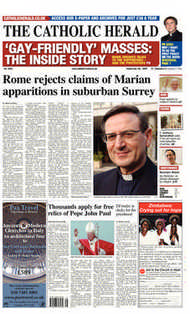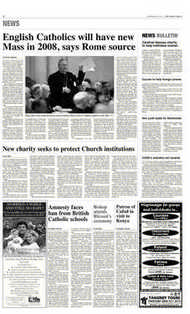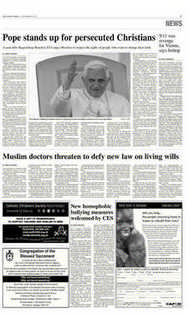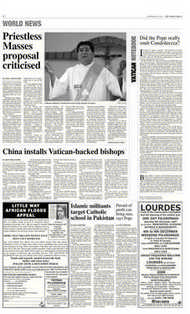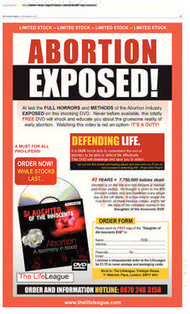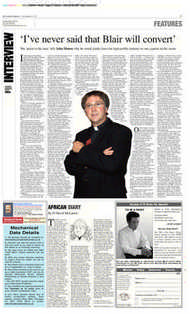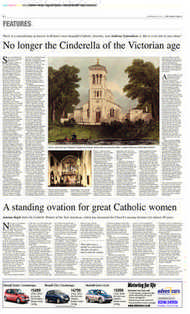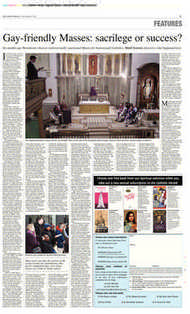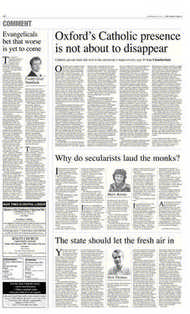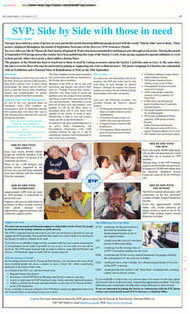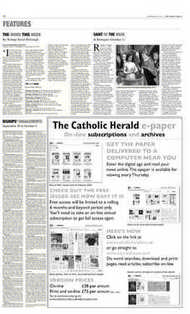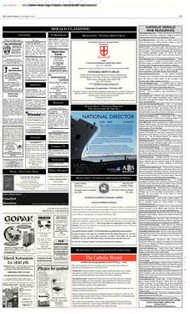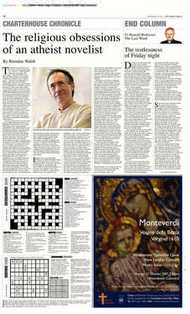Page 4, 28th September 2007
Page 4

Report an error
Noticed an error on this page?If you've noticed an error in this article please click here to report it.
Tags
Share
Related articles
Pope Makes Bold Appeal For Peace During Trip To Asia
Encyclical Acclaimed
Swift Vatican Move On Penal Code
Who Is In Charge Of The Vatican?
Gives Reasons The Pope
The Cardinal Who Tried To Stop The War
Did the Pope really snub Condoleezza?
It made for quite a splash: “US Secretary of State Condoleezza Rice snubbed by the Pope”, exclaimed the Italian daily Corriere della Sera on its front page last week. The story quickly spread around the world – even to Cuba, where it was heavily manipulated at America’s expense. But just how true was it?
In late July Rice was about to embark on a Middle East tour and, as the story goes, “absolutely needed to meet with Pope Benedict”. According to Massimo Franco, the article’s author, she hoped to have a papal audience on August 2 to bolster her imminent talks in the region. But the Pope, who was vacationing at his summer residence of Castel Gandolfo, refused to see her. Instead she had to make do with a telephone conversation with the Vatican Secretary of State, Cardinal Tarcisio Bertone.
Catholic News Service quoted an informed Vatican source as saying it was “absolutely not” the Vatican’s intention to rebuff Rice, or to signal any disagreement with US policy in the Middle East. Other sources have confirmed that, even for heads of state, protocol makes it extremely hard to have an audience with the Pope in early August. “The visit was always tentative,” says Francis Rooney, US Ambassador to the Holy See. “He wasn’t seeing anyone at that time, not a zip, so it’s understandable he wouldn’t see Secretary Rice.” Yet Mr Franco stands by his story. He believes that unofficially the Vatican wants to stay as far away as possible from a US-led international peace conference on the Middle East, scheduled for November. “They consider it to be too late and so not very effective,” he says, adding that some officials believe this “lame duck” US administration could even make matters worse in the region. Lending the Pope’s voice to Rice would also give the appearance of taking sides.
Franco also believes certain Vatican officials do not rate Rice highly. The problems, he says, began in 2003, when Rice questioned – apparently disrespectfully – Pope John Paul II’s decision to send Cardinal Pio Laghi to Washington in a bid to prevent the Iraq War. Further friction arose when Rice called the 2006 war in Lebanon a sign of the “birth pangs” of democracy in the Middle East. For these reasons, says Mr Franco, who recently wrote Parallel Empires, a highly acclaimed book on the history of US-Holy See relations, the Vatican “doesn’t consider her the best interlocutor for such touchy issues as those in the Middle East”.
Ambassador Rooney agrees that “some of the story is right”, namely the denial of a meeting, but not the alleged reasons for that denial. Another senior Rome diplomat, who spoke on condition of anonymity, also doubted that past disagreements had anything to do with it. Instead, he detected dirty tricks.
“Someone, probably with anti-American feelings, has spun a story trying to suggest tension between US and Holy See,” he argues. “It’s a completely wrong interpretation of what went on in my view.” What makes him particularly suspicious is the assertion that Rice “absolutely needed” to see the Pope words which, in the diplomatic world, would be very unusual unless matters were gravely serious. “That part of the story just doesn’t ring true,” he says. “It’s mischief-making on the part of those who stand to benefit from a dispute between the US and the Vatican.” So who could that be? Ambassador Rooney believes “some media person is having some fun” by rekindling old USVatican disagreements over the war. Some have pointed the finger at Mr Franco himself. After all, his book, which details Vatican-US relations leading up to the Iraq War, is about to be published in English. Mr Franco, however, insists the story has been based on three high-level Vatican and US sources. Still, none of them are from the Secretariat of State, the one Vatican department that would know most about this affair. The more one knows about this story, the more one feels inclined to doubt it.
Beppe Grillo, a famed, Leftist Italian comedian, has moved from making hugely popular attacks on Italy’s unpopular political class to attacking the Pope. This week he called Benedict XVI a “German administrative delegate” in charge of two million black market employees, inferring they don’t pay tax (actually they do, but less than other citizens). The irony is that Grillo’s attack on the Pope came as the Holy Father strongly criticised what Grillo always attacks: capitalism. But as with most secularists, such valuable papal insights will conveniently escape his radar.
blog comments powered by Disqus


